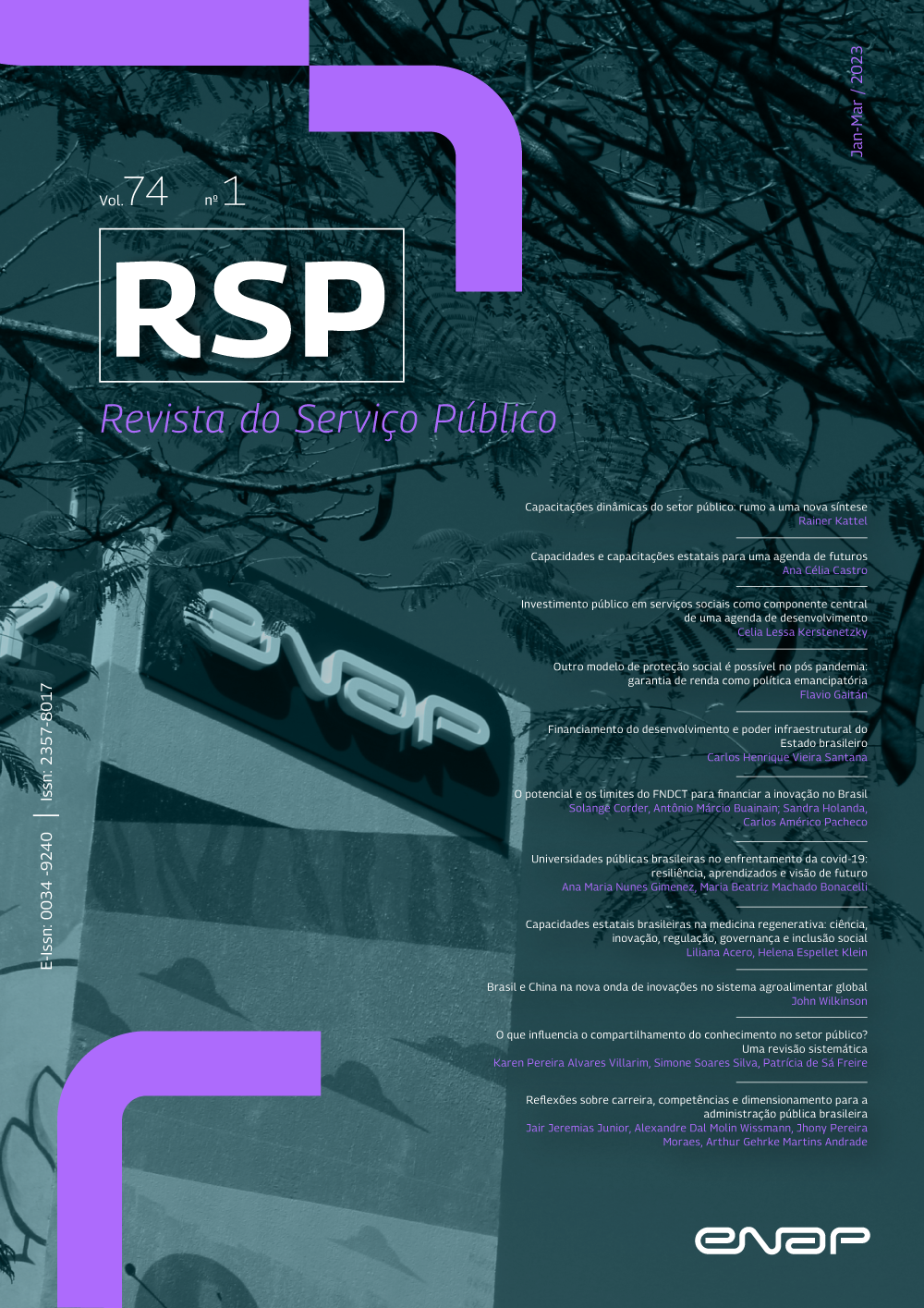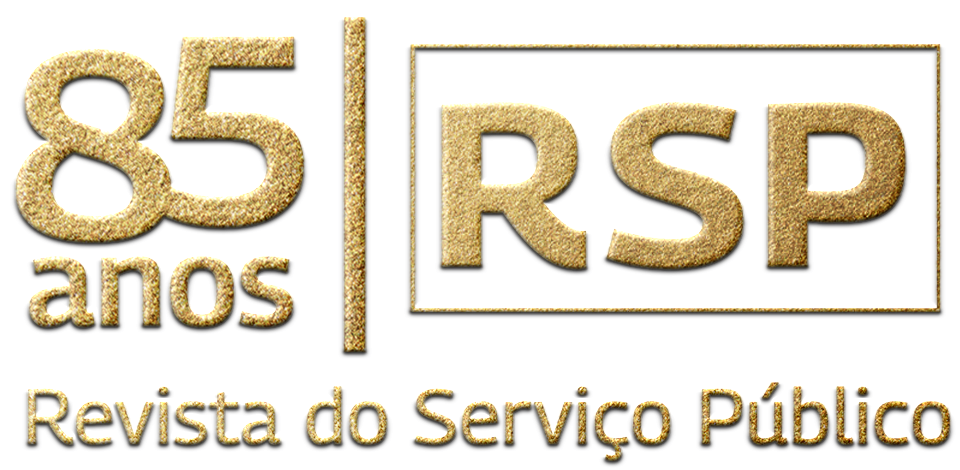O que influencia o compartilhamento do conhecimento no setor público? Uma revisão sistemática
Palavras-chave:
compartilhamento do conhecimento, setor público, revisão sistemáticaResumo
O setor público está sendo pressionado para melhorar a qualidade dos serviços e a produtividade dos servidores. Compartilhar conhecimento tem se mostrado uma estratégia eficaz para o alcance desses objetivos, todavia, há desafios devido às características do setor. Com o objetivo de contribuir para o avanço desse campo de pesquisa, desenvolveu-se essa revisão sistemática para verificar as variáveis que influenciam o compartilhamento do conhecimento em organizações do setor público. Foram recuperados artigos publicados nas bases de dados interdisciplinares Scielo, Web of Science e Scopus entre os anos de 2015 e 2022. A amostra final contemplou 24 artigos. Os resultados demonstram que o compartilhamento do conhecimento é influenciado por variáveis individuais, como confiança e comprometimento; variáveis organizacionais, como liderança e, em menor quantidade, variáveis relacionadas à tecnologia.
Downloads
Referências
ABBASI, S. G. et al. HPWSand knowledge sharing behavior: The role of psychological empowerment and organizational identification in public sector banks. Journal of public affairs, p. e2512, 2020.
AFSHAR JALILI, Y.; SALEMIPOUR, F. Group organizational citizenship behavior and knowledge sharing: The moderating role of workgroup emotional climate. VINE Journal of Information and Knowledge Management Systems, v. 50, n. 1, p. 117–135, 2019.
AHMAD, F.; KARIM, M. Impacts of knowledge sharing : a review and directions for future research Impacts of Knowledge Sharing : A review and directions for future research. Journal of Workplace Learning, v. 31, n. 3, p. 207–230, 2019.
ALI, A. A.; DOMINIC, P. D. D. The influence of technological factors on individual’s intention towards knowledge sharing practice. International Journal of Business Information Systems, v. 27, n. 3, p. 331–348, 2018.
AMBER, Q. et al. Knowledge sharing and social dilemma in bureaucratic organizations: Evidence from public sector in Pakistan. Cogent Business and Management, v. 6, n. 1, 2019.
ASLAM, U. et al. Exploring the sources and role of knowledge sharing to overcome the challenges of organizational change implementation. International Journal of Organizational Analysis, v. 26, n. 3, p. 567–581, 2018.
ASRAR-UL-HAQ, M.; ANWAR, S. A systematic review of knowledge management and knowledge sharing: Trends, issues, and challenges. Cogent Business and Management, v. 3, n. 1, p. 1–17, 2016.
AUGUSTO, R. et al. Gestão do conhecimento nas organizações públicas brasileiras : revisão e bibliometria de obras no período de 2008 a 2017. v. 72, n. 2, p. 452–478, 2017.
BIBI, S.; ALI, A. Knowledge sharing behavior of academics in higher education. Journal of Applied Research in Higher Education, v. 9, n. 4, p. 550–564, 2017.
BIN SARIPIN, M. S.; KASSIM, E. S. Factors of innovative behavior in Malaysia. Academy of Strategic Management Journal, v. 18, n. 6, p. 1–5, 2019.
CHEN, C.-A.; HSIEH, C.-W. Knowledge sharing motivation in the public sector: the role of public service motivation. International Review of Administrative Sciences, v. 81, n. 4, p. 812–832, 2015.
CHOI, Y. The Impact of Social Capital on Employees’ Knowledge-Sharing Behavior: An Empirical Analysis of U.S. Federal Agencies. Public Performance and Management Review, v. 39, n. 2, p. 381–405, 2016.
DALKIR, K. Knowledge management in theory and practice. Oxford: Elsevier, 2013.
DEY, T.; MUKHOPADHYAY, S. Linkage between contextual factors, knowledge-sharing mediums, and behaviour: Moderating effect of knowledge-sharing intentions. Knowledge and Process Management, v. 25, n. 1, p. 31–40, 2018.
ERMINE, J. L. Knowledge management: The creative loop. London: John Wiley & Sons, Inc., 2018. v. 5
FIERRO MORENO, E.; GARCIA CONTRERAS, R.; MARTINEZ AVILA, M. Organizational performance: the mediating effect of the knowledge sharing. OBETS, v. 12, n. 1, p. 169–189, 2017.
FIGUEIRA, J. P. S.; FARES, M. B. P.; FIALHO, F. A. P. the Seven Dimensions of Knowledge Creation: Discovery and Ethnography, Trial and Error, Abduction, Deduction, Induction, Connection and Revelation. Chaos & Complexity Letters, v. 12, n. 3, p. 157–183, 2018.
GAGNÉ, M. et al. Different motivations for knowledge sharing and hiding: The role of motivating work design. Journal of Organizational Behavior, v. 40, n. 7, p. 783–799, 2019.
GARCÍA CONTRERAS, R.; FIERRO-MORENO, E. Comportamiento desviado en el trabajo y compartir conocimiento: la relación y el efecto mediador de la alienación laboral. Revista científica Pensamiento y Gestión, v. 0, n. 46, 2019.
GORRY, G. A. Sharing knowledge in the public sector: Two case studies. Knowledge Management Research and Practice, v. 6, n. 2, p. 105–111, 2008.
HENDRYADI et al. Bureaucratic culture, empowering leadership, affective commitment, and knowledge sharing behavior in Indonesian government public services. Cogent Business and Management, v. 6, n. 1, 2019.
HENTTONEN, K.; KIANTO, A.; RITALA, P. Knowledge sharing and individual work performance: an empirical study of a public sector organisation. Journal of Knowledge Management, v. 20, n. 4, p. 749–768, 2016.
HUYSMAN, M. H.; WULF, V. Social Capital and IT, current debate and research. In: In M. Huysman, & V. Wulf (Eds.), Social Capital and IT. Cambridge: MIT Press, 2004. p. 1–17.
KHAN, N. A.; KHAN, A. N. What followers are saying about transformational leaders fostering employee innovation via organisational learning, knowledge sharing and social media use in public organisations? Government Information Quarterly, v. 36, n. 4, 2019.
KIM, S. Public Service Motivation, Organizational Social Capital, and Knowledge Sharing in the Korean Public Sector. Public Performance and Management Review, v. 41, n. 1, p. 130–151, 2018.
KIPKOSGEI, F.; SON, S. Y.; KANG, S.-W. Coworker Trust and Knowledge Sharing among Public Sector Employees in Kenya. INTERNATIONAL JOURNAL OF ENVIRONMENTAL RESEARCH AND PUBLIC HEALTH, v. 17, n. 6, mar. 2020.
LIN, X. Review of Knowledge and Knowledge Management Research. American Journal of Industrial and Business Management, v. 09, n. 09, p. 1753–1760, 2019.
MANAF, H. A. et al. Managerial Tacit Knowledge, Individual Performance, and the Moderating Role of Employee Personality. International Journal of Public Administration, v. 41, n. 15, p. 1258–1270, 2018.
MANAF, H. A. et al. Differences in personality and the sharing of managerial tacit knowledge: an empirical analysis of public sector managers in Malaysia. Journal of Knowledge Management, v. 24, n. 5, p. 1177–1199, 2020.
MANCHIKANTI, L. et al. Evidence-based medicine, systematic reviews, and guidelines in interventional pain management: Part 6. Systematic reviews and meta-analyses of observational studiesPain Physician, set. 2009.
MASOOD, M.; AFSAR, B. Transformational leadership and innovative work behavior among nursing staff. NURSING INQUIRY, v. 24, n. 4, 2017.
MATZLER, K. et al. Personality traits and knowledge sharing. Journal of Economic Psychology, v. 29, n. 3, p. 301–313, jun. 2008.
MOHER, D. et al. Preferred reporting items for systematic review and meta-analysis protocols (prisma-p) 2015 statement. Systematic Reviews, v. 47, n. 4, p. 1–9, 2015.
MORENO, E. F.; AVILA, M. M.; GARCIA-CONTRERAS, R. CAN GENDER BE A DETERMINANT OF ORGANIZATIONAL PERFORMANCE AND KNOWLEDGE SHARING IN PUBLIC SECTOR ORGANIZATIONS? AD-MINISTER, n. 32, p. 137–158, 2018.
MURTAZA, G. et al. Impact of Islamic Work Ethics on Organizational Citizenship Behaviors and Knowledge-Sharing Behaviors. Journal of Business Ethics, v. 133, n. 2, p. 325–333, 2016.
NORTH, K.; KUMTA, G. Knowledge Management: Value Creation Through Organizational Learning. 2. ed. Switzerland: Springer, 2018.
NORULKAMAR, U.; HATAMLEH, A. A review of knowledge sharing barriers among academic staff - a Malaysian perspective. v. 2, n. 2, p. 87–91, 2014.
ONONYE, U. H.; IGWE, A. Knowledge sharing process and innovation success: Evidence from public organisations in southern Nigeria. 2019.
OZER, M.; VOGEL, D. Contextualized Relationship between Knowledge Sharing and Performance in Software Development. Journal of Management Information Systems, v. 32, n. 2, p. 134–161, 2015.
PAGE, M. J. et al. The PRISMA 2020 statement: An updated guideline for reporting systematic reviews. The BMJ, v. 372, 2021.
PARK, M. J.; DULAMBAZAR, T.; RHO, J. J. The effect of organizational social factors on employee performance and the mediating role of knowledge sharing: focus on e-government utilization in Mongolia. Information Development, v. 31, n. 1, p. 53–68, jan. 2015.
RASDI, R.; TANGARAJA, G. Knowledge-sharing behaviour in public service organisations: determinants and the roles of affective commitment and normative commitment. EUROPEAN JOURNAL OF TRAINING AND DEVELOPMENT, 2020.
RAZA, I.; AWANG, Z. Knowledge-sharing practices in higher educational institutes of Islamabad, Pakistan: an empirical study based on theory of planned behavior. 2020a.
RAZA, I.; AWANG, Z. Knowledge sharing in multicultural organizations: evidence from Pakistan. Higher Education, Skills and Work-based Learning, v. 10, n. 3, p. 497–517, 2020b.
RIZZON, F.; TAMIOSSO, L. C.; FACHINELLI, A. C. Barreiras ao Compartilhamento do Conhecimento nas Organizações: Revisão Sistemática de Literatura. XVI Mostra de Iniciação Científica, Pós-graduação, Pesquisa e Extensão. Anais...Caxias do Sul: Universidade de Caxias do Sul, 2016
SCHWARTZ, D. G. Encyclopedia of Knowledge Management. Hershey: Idea Group Reference, 2006. v. 1
SHAARI, R.; RAJAB, A.; YUSOFF, R. M. The organizational issues of knowledge sharing among academic staffs in the malaysian public universities. International Journal of Knowledge, Culture and Change Management, v. 10, n. 6, p. 133–147, 2010.
SORDI, V. F. et al. Fatores Determinantes E Possíveis Barreiras Ao Compartilhamento De Conhecimento Nas Organizações. Revista Eletrônica de Estratégia & Negócios, v. 10, n. 2, p. 225, 2017.
SORDI, V. F.; NAKAYAMA, M. K.; CASTRO, C. J. C. A. O papel da liderança na criação e compartilhamento de conhecimento organizacional The role of Leadership in the creation and sharing of organizational knowledgeRGCTI. [s.l: s.n.].
TAJDINI, J.; TAJEDDINI, O. Innovativeness and knowledge management in public sector enterprises. MIDDLE EAST JOURNAL OF MANAGEMENT, v. 5, n. 3, p. 271–295, 2018.
TAMTA, V.; RAO, M. K. The effect of organisational justice on knowledge sharing behaviour in public sector banks in India: Mediating role of work engagement. International Journal of Business Excellence, v. 12, n. 1, p. 1–22, 2017a.
TAMTA, V.; RAO, M. K. Linking Emotional Intelligence to Knowledge Sharing Behaviour: Organizational Justice and Work Engagement as Mediators. Global Business Review, v. 18, n. 6, p. 1580–1596, 2017b.
TOKAR, D. M.; FISCHER, A. R.; MEZYDLO SUBICH, L. Personality and Vocational Behavior: A Selective Review of the Literature, 1993-1997. Journal of Vocational Behavior, v. 53, n. 2, p. 115–153, out. 1998.
TRIPATHI, D. et al. Does servant leadership affect work role performance via knowledge sharing and psychological empowerment? VINE JOURNAL OF INFORMATION AND KNOWLEDGE MANAGEMENT SYSTEMS, 2020.
VONG, S.; ZO, H.; CIGANEK, A. P. Knowledge sharing in the public sector: Empirical evidence from Cambodia. INFORMATION DEVELOPMENT, v. 32, n. 3, p. 409–423, jun. 2016.
WANG, S.; NOE, R. Knowledge Sharing: A Review and Directions for Future Research. Human Resource Management Review, v. 20, p. 115–131, 1 jun. 2010.
YAMIN, M. A. Y. Examining the effect of organisational innovation on employee creativity and firm performance: Moderating role of knowledge sharing between employee creativity and employee performance. International Journal of Business Innovation and Research, v. 22, n. 3, p. 447–467, 2020.
YASIR, M.; MAJID, A. Relationship between determinants of organisational structure and knowledge sharing. International Journal of Business Excellence, v. 12, n. 3, p. 294–307, 2017.
YUDHISTIRA, D. S.; SUSHANDOYO, D. Does political self-disclosure in social media hamper tacit knowledge sharing in the workplace? VINE Journal of Information and Knowledge Management Systems, v. 50, n. 3, p. 513–530, 2020.
Downloads
Publicado
Como Citar
Edição
Seção
Licença
Copyright (c) 2023 Revista do Serviço Público

Este trabalho está licenciado sob uma licença Creative Commons Attribution-NonCommercial-ShareAlike 4.0 International License.
- A RSP adota a licença Creative Commons (CC) do tipo Atribuição – Uso Não-Comercial (BY-NC).
- A licença permite que outros remixem, adaptem e criem obra licenciada, sendo proibido o uso com fins comerciais.
- As novas obras devem fazer referência ao autor nos créditos e não podem ser usadas com fins comerciais, porém não precisam ser licenciadas sob os mesmos termos dessa licença.
- Ao publicar o artigo na RSP, o autor cede e transfere para a ENAP os direitos autorais patrimoniais referentes ao artigo.
- O artigo publicado na RSP não poderá ser divulgado em outro meio sem a devida referência à publicação de origem.
- O autor que tiver o artigo publicado na RSP deverá assinar o Termo de Concessão de Direitos Autorais (em momento oportuno a editoria da Revista entrará em contato com o autor para assinatura do Termo).



